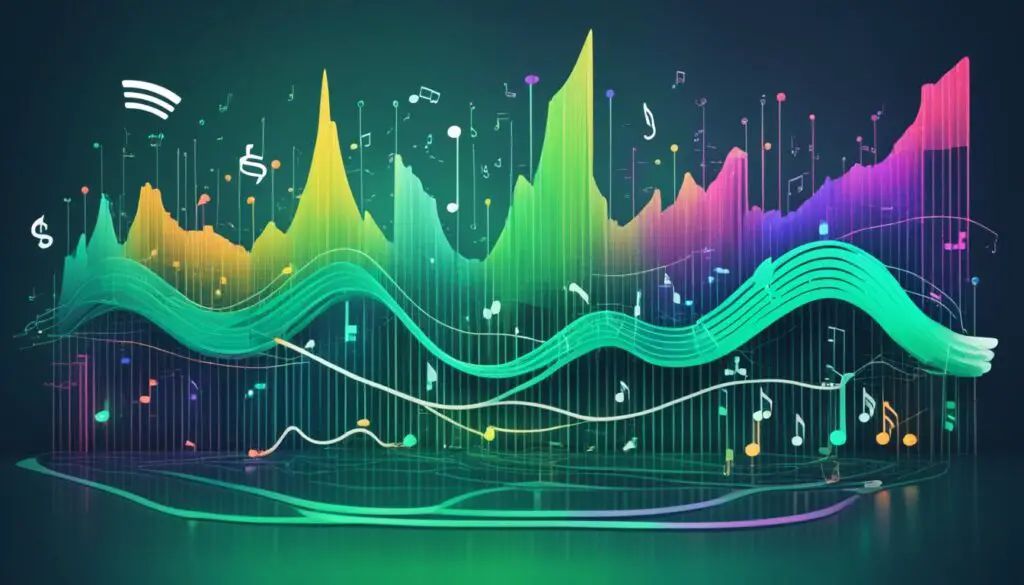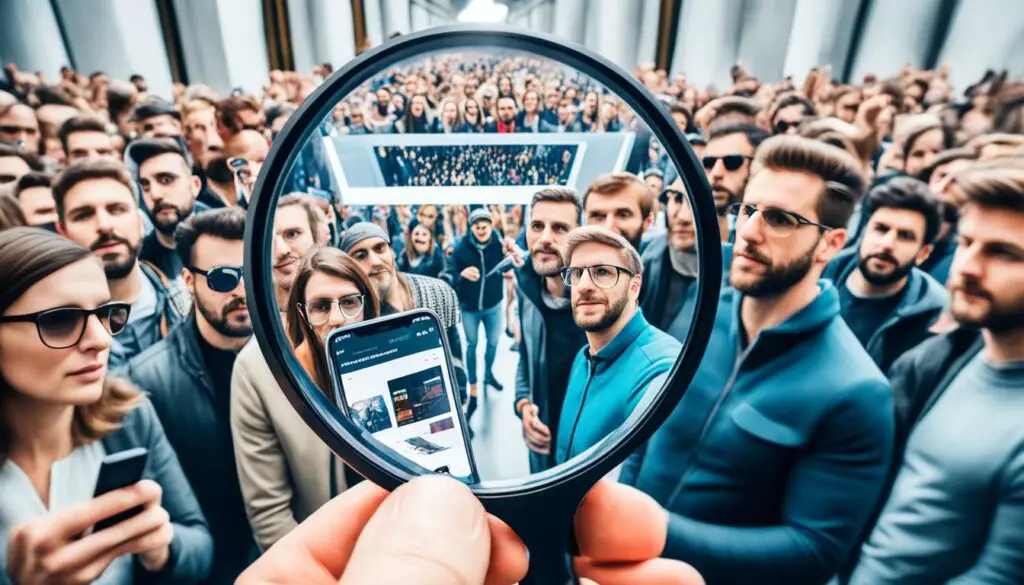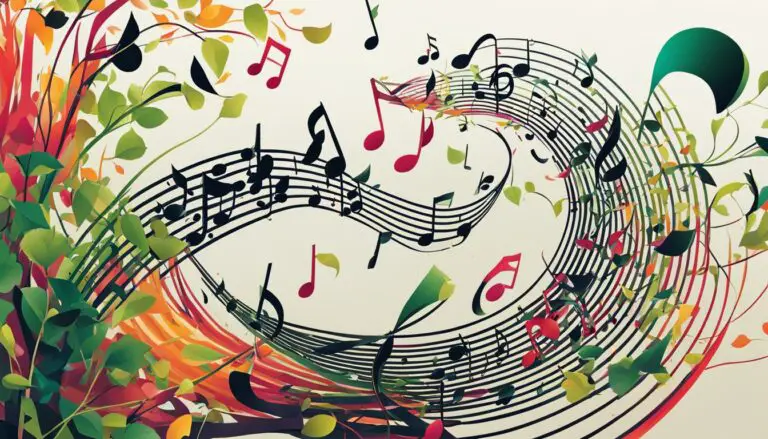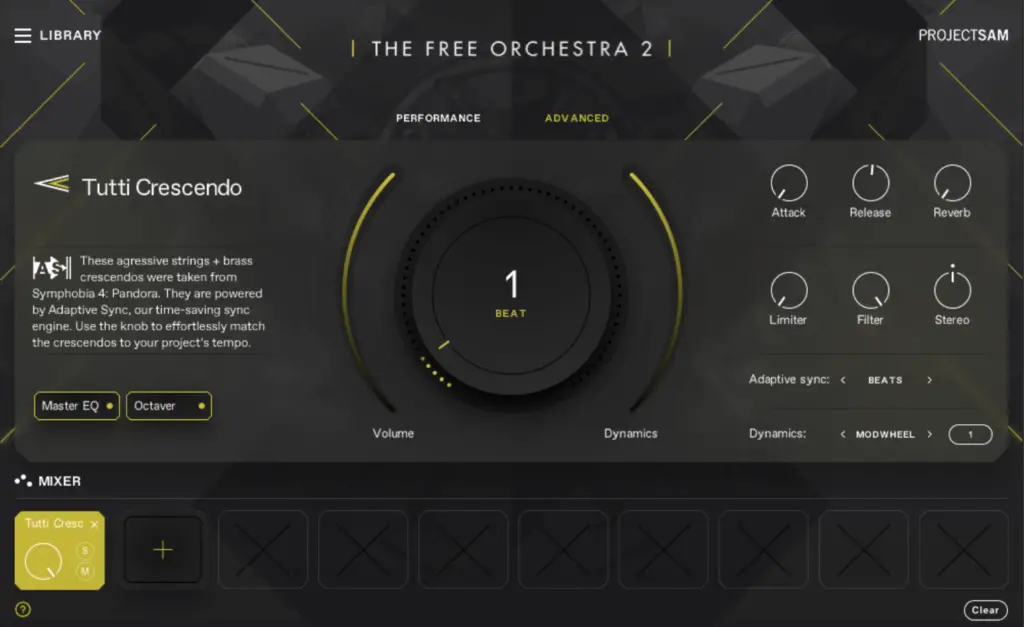Five years ago, Music Business Worldwide shared a story. It was about Spotify favouring Epidemic Sound’s music. Epidemic Sound has the same investors as Spotify. They offered music at a discount to help Spotify save money on paying music rights holders. Even though Spotify is doing well financially and is a top player in streaming, artists are not happy about their payments. They feel Spotify’s target for more users and profits is unfair to them.
Spotify has grown a lot. It now has over 500 million users worldwide. It holds a big 31% of the global streaming market. This user growth has also led to a big increase in money from streaming songs. It is expected to hit $50.1 billion by 2030. But this big rise in users hasn’t meant more money for the artists. This has started a big conversation in the music world. They’re talking about whether Spotify’s way of attracting more users is hurting musicians.
The debate around fair artist compensation grew louder when the UK looked into streaming. They found out over half of all Spotify playlist plays were from playlists made by users, not Spotify. User-made content has a huge impact. This finding plus the wish from artists for clearer rules on how songs are picked for playlists and recommended to listeners, points to a deep need for change in how the music streaming industry works.
Key Takeaways
- Spotify’s membership has surged to over 500 million users globally, commanding a 31% share of the global music streaming market.
- The rapid growth in Spotify’s user base has led to exponential growth in music streaming revenue, projected to reach $50.1 billion by 2030.
- Despite Spotify’s financial success, many artists have expressed dissatisfaction with the stagnation in their royalty payments, with concerns that the platform’s focus on user growth and profitability has come at the expense of fair compensation.
- The United Kingdom’s Competition and Markets Authority study found that over half of plays on Spotify playlists come from user-made playlists, highlighting the significant influence of user-generated content on the platform.
- Musicians have expressed a desire for more transparency around playlisting and algorithmic recommendations, showcasing the need for better communication and fairness in the music streaming industry.
Spotify’s Meteoric Rise Amid Streaming Dominance
Spotify is leading the way in music streaming. It has grabbed 31% of the global streaming market. There are over 500 million people using it. Plus, streaming now makes up 67% of music revenue.
Spotify’s Commanding Market Share in Global Music Streaming
In today’s world, Spotify is the top choice for music lovers. It’s the platform with the most users, over 500 million, showing its global popularity. This has helped it become the biggest player in streaming music.
The Exponential Growth of Music Streaming Revenue
The more Spotify grows, the more money the music industry makes. By 2030, it could hit $50.1 billion. This huge increase is mostly from more people streaming music. It shows how Spotify is changing how we listen to music.
| Metric | 2021 Value | Growth Rate |
|---|---|---|
| Global Recorded Music Market Revenue | $25.9 billion | 18.5% |
| Streaming Revenue | $16.9 billion | 65% of total revenue |
| New Music Streaming Subscribers | 109.5 million | – |
| Total Music Streaming Subscribers Worldwide | 523.9 million | – |
| Video Streaming Market Size | $376.06 billion (2020) | $932.29 billion (2028 projection) |
This table shows how fast streaming music is growing. Now, 65% of music money comes from streaming. Over 500 million people stream music. And, video streaming is also getting bigger. This all points to a digital future for entertainment, making Spotify more and more important.
spotify increasing membership, artists royalties stay the same
Spotify’s popularity and money from streams are going up fast. But, many artists feel they’re not getting paid enough. They say their royalty payments have stayed low, even with Spotify’s success.
Spotify focuses on gaining more users and making money. This seems to be affecting how much artists get paid. Artists are not happy with the small amount they make from Spotify.
Spotify’s growing membership and artists’ low royalties have started big arguments in the music world. Many are questioning if Spotify’s way of doing business is fair to musicians.
| Statistic | Value |
|---|---|
| Spotify payouts to the music industry as of 2023 | Exceeded $40 billion |
| New Spotify royalty model aim to drive in streaming revenue towards independent and professional artists over the next five years | $1 billion |
| Annual fees and withdrawal charges lost within the music streaming system | Approximately $40 billion |
| Minimum track plays per year to generate recorded royalties for artists on Spotify starting in 2024 | 1,000 times |
| Percentage of tracks streamed on Spotify still monetized under the new model | 99.5% |
The Algorithmic Playlist Phenomenon
Spotify has changed how we find and enjoy music through playlists like Discover Weekly and Daily Mix. They suggest songs based on what you like. This has made more people want to use Spotify, leading to more music being streamed and more money made.
Categorisation of Artists on Spotify Playlists
Your Music Marketing looked at how Spotify puts different artists on playlists. They found four main groups: Emerging Artists, Artists In Development, Established Artists, and Stars. Most of the artists on playlists are in the Artists In Development group. This shows how Spotify helps new and growing artists get noticed.
The Impact of Algorithmic Playlists on Listening Habits
Spotify’s playlists suggest music that fits your taste, making up 61% of what we listen to. This is more than playlists made by people at Spotify. It means that the algorithm playlists have a big say in what music succeeds.

The Debate Over Fair Artist Compensation
Artists’ Dissatisfaction with Streaming Royalty Rates
There’s a big gap between how many people use Spotify and the money artists get. This has caused lots of talk in the music world. A study from Germany found that 90% of artists think they’re not paid fairly. Over half say the streaming sites keep too much money.
In the UK and US, artists want more details about how songs get on playlists. They also want to know how suggestions are made by algorithms. Everyone agrees that as more people listen on these platforms, the way artists are paid needs a rethink. Many artists are still finding it hard to earn enough, even though streaming money is growing.
| Streaming Service | Royalty Rate per Stream |
|---|---|
| Spotify | £0.0046 – £0.0064 |
| Apple Music | £0.0059 |
When we look at the table, we see Spotify pays artists less than Apple Music does. This big difference in pay has made the debate on fair artist payment even hotter.
Spotify’s Controversial Playlist Practices
Spotify has been growing fast, and now many people stream music on it. However, some say it does not treat all musicians fairly. They claim music from Spotify’s own label, Epidemic Sound, gets more attention than songs from small independent artists. This means the smaller artists make less money.
The Presence of “Fake Artists” on Spotify Playlists
Another issue people talk about is “fake artists”. These artists are not real people but songs from music libraries. Their music is free to use but gets on popular Spotify playlists. This raises concerns about how Spotify picks and uses songs. It also worries people about musicians getting paid fairly.
These problems show how important Spotify’s playlists are for musicians. They affect how much money and attention an artist gets. It makes many wonder if Spotify is being fair and clear with its choices. People question how Spotify’s own goals might be changing how musicians are treated.
The Role of Playlists in Music Discovery
Playlists are key for finding new music on platforms like Spotify. They make up more than a third of all music listened to. This big number shows how important they are for discovering new tunes. The spotify increasing membership and the bigger music streaming revenue are partly thanks to these playlists.
Industry Perspectives on the Influence of Playlists
The big music players, including top artists and their teams, know playlists are a big deal. They use them to help get their music out there and connect with fans. But for those who are just starting out, like indie artists, playlists don’t always mean big money. This shows there’s still a lot of work to do on making sure everyone gets a fair share (being paid) and understanding how that money is divided in the music biz.
Exploring Alternative Music Discovery Methods
People are starting to question Spotify’s playlist policies and how they affect money for artists. As a result, there’s a push to find new ways to discover music. One way is to try different strategies for growing the spotify subscription pricing and making it easier for fans to find new artists. Also, there’s a need for new platforms and tech that support all kinds of musicians getting their music heard.
Initiatives to Support Struggling Artists
As the music industry faces challenges, efforts to help struggling musicians are rising. These initiatives aim to fix problems caused by the move to streaming and offer stable support.
Basic Income Programs for Artists in Various Countries
Ireland is a good example with its new basic income program. It will help over 2,000 artists, including 500 musicians, keep their creative work going. This kind of help is also seen in Finland and Spain.
These programs aim to bridge the gap between the growing number of spotify increasing membership and the flat artist royalties. They make sure artists have more stable funding. This could lead to a fairer system for both artists and the music industry.
Dealing with issues like royalty rates and royalty distribution transparency is tough. But these income projects give artists hope. They ease the struggle against the complexities of spotify premium vs free tier and the impact of big streaming platforms.
The Rise of Virtual Artists and AI Music
The music world is changing fast, with AI and virtual musicians stepping onto the stage. For instance, Capitol Records signed up FN Meka. This ‘AI rapper’ is making waves but faced criticism too.
Some think these tech singers might take over from human players. They say it could make us not need as many real artists.
The Controversy Surrounding FN Meka and Capitol Records
FN Meka’s deal with Capitol Records got a lot of people talking. Many were glad to see new faces in music, but others were upset. They thought the project showed a lack of respect. It also stirred up questions about using tech in music so heavily.
The Future of AI-Generated Music and Virtual Performers
The future of music is looking different with AI and virtual stars. It’s got people thinking about the jobs of real musicians. Some worry it could change music in a big way. They wonder what it might mean for culture.
While music keeps changing, the use of AI and virtual stars is a big question. Could this tech move traditional musicians out? And what does it mean for all of us?
Regulatory Scrutiny and Calls for Transparency
People are increasingly worried about Spotify’s fairness towards artists and their pay. This has sparked closer looks by regulators, with antitrust probes into music streaming platforms around the world.
Antitrust Investigations into Music Streaming Platforms
At the same time, artists and music industry players want clearer insights into how royalties are shared out. They’re asking streaming services to show them exactly how they divide their money among different rights owners.
Demands for Greater Transparency in Royalty Distribution
By pushing for more oversight and transparency, these actions hope to deal with the main problems. These issues include why there’s a big gap between the music industry’s rising overall income and artist pay stays flat.

Conclusion
The music world is changing, with more people streaming music than ever before. This is mainly thanks to Spotify. This shift has made music streaming income grow a lot. Yet, artists haven’t seen their incomes rise much. Many are upset because they don’t earn more from streaming.
Many discussions are happening about how artists are paid fairly. There are also questions about how Spotify picks what songs go on playlists. The rise of virtual performers and AI-generated music is making people think. They wonder if the way musicians are paid needs to change. This would make the music business fairer and stronger for everyone.
The music world is always changing. It’s important to think about everyone’s needs. This includes the streaming services, the people who own the music rights, and the artists. By working together, they can solve the issues artists face. This way, everyone can benefit from the growth of the music industry.
FAQ
What is Spotify’s current market share in the global music streaming industry?
How has the growth in music streaming revenue impacted the music industry?
Why are some artists dissatisfied with the royalties they receive from Spotify?
How do Spotify’s algorithmic playlists influence music consumption and artist visibility?
How have Spotify’s playlist practices been criticised by artists and industry stakeholders?
What initiatives have been introduced to support struggling artists in the music industry?
How has the rise of virtual artists and AI-generated music impacted the music industry?
What regulatory scrutiny and calls for transparency have emerged in the music industry?
Source Links
- https://pennyfractions.ghost.io/why-majors-and-spotify-love-fake-artists/
- https://viberate.com/blog/music-analytics/how-are-spotify-monthly-listeners-calculated-a-deep-dive/
- https://www.linkedin.com/posts/slashdot-media_spotifys-editorial-playlists-are-losing-activity-7149169137234161665–Hex
- https://www.unesco.org/creativity/sites/default/files/medias/fichiers/2023/01/2-policy_perspectives_music_en-web.pdf
- https://medium.com/@globalmusicinstitute_GMI/reshaping-royalty-models-spotifys-new-plan-to-tackle-current-issues-within-streaming-c36974003e99
- https://www.dailymail.co.uk/news/article-12340071/does-Spotify-price-increase-mean-artists-paid-more.html
- https://www.gov.uk/government/publications/research-into-the-impact-of-streaming-services-algorithms-on-music-consumption/the-impact-of-algorithmically-driven-recommendation-systems-on-music-consumption-and-production-a-literature-review
- https://musictech.solutions/2022/10/
- https://www.theguardian.com/music/2021/apr/10/music-streaming-debate-what-songwriter-artist-and-industry-insider-say-publication-parliamentary-report
- https://musically.com/2020/05/05/spotify-should-pay-musicians-more-lets-talk-about-how/
- https://www.godisinthetvzine.co.uk/2019/04/10/opinion-why-we-need-fairer-alternatives-to-spotify/
- https://www.forbes.com/sites/billrosenblatt/2023/10/26/spotifys-new-royalty-model-contends-with-the-age-of-musical-overabundance/
- https://www.musicbusinessworldwide.com/confirmed-next-year-tracks-on-spotify-1000-plays/
- https://musically.com/2020/11/02/spotify-artist-tool-boost-streams-discounted-royalty-rate/
- https://news.unitedmasters.com/blog/spotify-discovery-mode
- https://pirate.com/en/blog/can-bandcamp-compete-with-spotify/
- https://www.forbes.com/sites/forbesbusinesscouncil/2023/02/16/protecting-artists-financially-with-the-continued-rise-of-streaming-platforms/
- https://www.godisinthetvzine.co.uk/2023/11/28/opinion-ai-an-opening-of-future-opportunities-or-a-threat-to-artists/
- https://www.goldmansachs.com/intelligence/pages/gs-research/music-in-the-air-focus-on-monetisation-emerging-markets-and-ai/report.pdf
- https://wavv.medium.com/the-tides-of-time-music-and-ais-intertwined-evolution-d8a4ffbbec80
- https://www.nytimes.com/2021/05/07/arts/music/streaming-music-payments.html
- https://sg.news.yahoo.com/face-music-streaming-industry-change-230000226.html
- https://music3point0.com/2021/05/05/spotify-price-increase/
- https://medium.com/@JPriceOfMusic/the-definitive-guide-to-spotify-royalties-dc5960862c00



